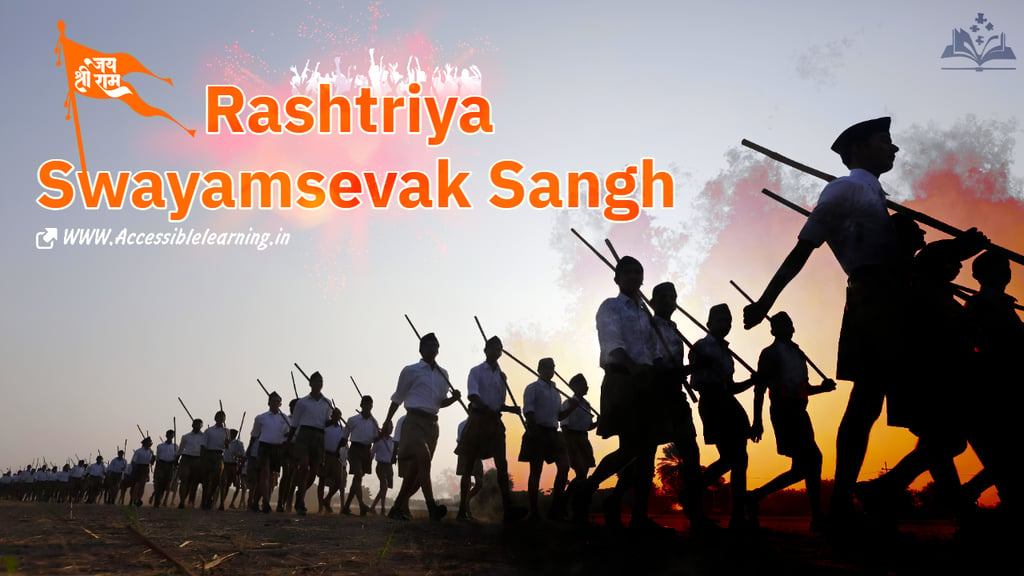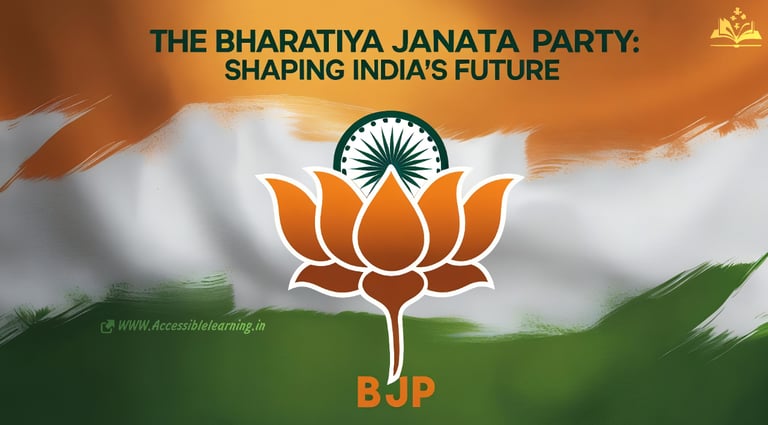
Rashtriya Swayamsevak Sangh (RSS): Shaping Modern India's Identity
The Rashtriya Swayamsevak Sangh (RSS) in this in-depth analysis of its origins, ideology, structure, activities, influence, and controversies. Gain insights into its role in shaping India's socio-political and cultural landscape while understanding the debates surrounding this influential organization.
RSSMODERN INDIAEDUCATION/KNOWLEDGEBJPHISTORY
Sachin K Chaurasiya
1/26/20257 min read


The Rashtriya Swayamsevak Sangh (RSS) is one of the largest and most influential socio-political organizations in India. Established in 1925, the RSS has played a pivotal role in shaping India's cultural, social, and political landscape. Despite its prominence, the organization is often a subject of significant debate, admiration, and criticism. This article delves into the origins, ideology, structure, activities, and controversies surrounding the RSS to provide an in-depth and balanced understanding.
Origins and Founding Principles
The RSS was founded on September 27, 1925, in Nagpur, Maharashtra, by Dr. Keshav Baliram Hedgewar Ji, during a period of significant upheaval in India’s history. The early 20th century saw the country grappling with British colonial rule, widespread socio-economic disparities, and rising communal tensions. Hedgewar, inspired by nationalist movements and deeply influenced by his participation in the Indian freedom struggle, envisioned the RSS as a means to unite Hindus, foster a sense of pride in Indian heritage, and counteract colonial and divisive forces. The organization aimed to address the fragmentation within Indian society and build a disciplined, self-reliant community to contribute to the nation’s resurgence. a physician and nationalist. Hedgewar envisioned an organization dedicated to revitalizing India’s cultural heritage and fostering unity among Hindus. The early 20th century was a period of colonial domination and growing communal tensions, and Hedgewar believed that national strength lay in a cohesive Hindu society.
The term “Rashtriya Swayamsevak Sangh” translates to “National Volunteer Organization.” Its foundational principles revolve around the belief that India is inherently a Hindu nation, not in a religious sense alone but as a civilizational identity. The RSS aims to instill discipline, patriotism, and selflessness among its members to serve society and the nation.
The organization initially operated in a modest setting, with just a few volunteers participating in physical drills, discussions, and small community outreach programs. However, its growth trajectory was marked by the establishment of the first shakha (branch) in 1926, which became a model for grassroots engagement. Over the following decades, the RSS organized several public events, including patriotic parades and cultural festivals, which attracted broader participation. The group also focused on addressing local issues, such as literacy and hygiene, which helped garner support from diverse communities and laid the foundation for its nationwide expansion. Over time, it expanded its network and activities, evolving into a nationwide movement. The founder’s vision of cultural rejuvenation through grassroots efforts became the cornerstone of its philosophy.
Ideology and Vision
The RSS is deeply rooted in the concept of Hindutva, a term popularized by Vinayak Damodar Savarkar Ji. Hindutva advocates for the cultural and civilizational unity of Hindus, emphasizing shared values, traditions, and history.
While the RSS describes itself as a cultural organization, it sees Hindu culture as the cornerstone of India’s identity. This perspective has often led to accusations of exclusivity and polarization, particularly from minority communities. However, the RSS asserts that its ideology is inclusive, advocating for the integration of all communities within the broader Indian ethos.
The organization’s vision is not confined to religious revivalism but also includes a commitment to national integration, economic self-reliance, and social harmony. It emphasizes the importance of character-building, family values, and community service as pathways to a stronger nation.


Organizational Structure
The RSS operates as a cadre-based organization with a decentralized structure. It is led by the Sarsanghchalak (Chief), a position currently held by Mohan Bhagwat (as of 2025). Key aspects of its structure include
Shakhas: The backbone of the RSS, shakhas are daily gatherings where members engage in physical exercises, discussions, and ideological training. There are thousands of shakhas across India, attracting people of all ages. Each shakha serves as a local hub for fostering community spirit and discipline.
Volunteers: Members of the RSS are called Swayamsevaks, or volunteers. They come from diverse backgrounds but are united by their commitment to the organization’s goals. Participation in the RSS is voluntary, and members often balance their contributions with their personal and professional lives.
Affiliate Organizations: Over the years, the RSS has established several affiliate organizations collectively known as the Sangh Parivar (Sangh family). These include the Bharatiya Janata Party (BJP), Vishwa Hindu Parishad (VHP), Akhil Bharatiya Vidyarthi Parishad (ABVP), Seva Bharati, and others, extending the RSS’s influence into politics, education, labor, and more.
Training Programs: The RSS organizes extensive training camps known as Officers’ Training Camps (OTC), where swayamsevaks undergo rigorous ideological and leadership training. These camps are instrumental in preparing members for organizational and public roles.
Activities and Social Initiatives
Educational and Cultural Programs: The RSS promotes education emphasizing Indian culture, history, and values. It runs schools through organizations like the Vidya Bharati network. These institutions aim to impart holistic education that blends academic excellence with ethical grounding.
Disaster Relief and Social Service: The organization is known for its swift response during natural disasters, such as floods, earthquakes, and pandemics. Swayamsevaks often participate in relief and rehabilitation efforts, providing food, shelter, and medical aid to affected communities.
Rural Development: Through initiatives like the Ekal Vidyalaya (single-teacher schools), the RSS works to uplift rural and tribal communities by providing education and vocational training. These efforts aim to bridge the urban-rural divide and empower marginalized groups.
Health and Hygiene Campaigns: The RSS undertakes campaigns to promote health awareness, sanitation, and hygiene in underserved areas. These initiatives align with broader national goals, such as the Swachh Bharat Abhiyan (Clean India Mission).
Environmental Conservation: The RSS emphasizes the importance of protecting the environment, organizing extensive tree-planting drives that have resulted in the plantation of millions of saplings across India. It has actively promoted water conservation projects by constructing check dams, desilting rivers, and restoring traditional water bodies in drought-prone areas. Additionally, the organization conducts awareness campaigns on sustainable living practices, such as waste segregation and the use of renewable energy sources, directly benefiting thousands of rural households. These efforts align with their broader goal of ecological balance and community participation in environmental stewardship.
National Integration: The RSS conducts programs to foster unity among India’s diverse communities, though these efforts are often viewed through the lens of its Hindutva ideology. It organizes cultural festivals, patriotic events, and inter-community dialogues to promote harmony.
Influence in Politics
Though the RSS claims to be apolitical, its influence on Indian politics is undeniable. The Bharatiya Janata Party (BJP), India’s ruling party (as of 2025), is ideologically aligned with the RSS. This alignment significantly influences the BJP’s policies and strategies, reflecting core RSS principles such as promoting cultural nationalism, fostering self-reliance, and prioritizing indigenous traditions. For instance, the BJP’s focus on policies like the Swachh Bharat Abhiyan (Clean India Mission), educational reforms emphasizing Indian heritage, and economic measures such as promoting local industries (vocal for local) resonate with the RSS’s broader vision. Moreover, the RSS’s grassroots network provides the BJP with substantial electoral and organizational support, enabling it to mobilize voters effectively and maintain a connection with diverse communities across India. Many BJP leaders, including Prime Ministers Atal Bihari Vajpayee and Narendra Modi, began their careers as RSS members.
The RSS provides ideological guidance and grassroots support to the BJP, shaping its policies and electoral strategies. Critics argue that this nexus blurs the line between religion and state, while supporters view it as a legitimate expression of cultural nationalism.
Additionally, the RSS has influenced policy discussions on issues such as national security, education, and economic reforms. Its sway over civil society and its vast network of swayamsevaks enable it to exert significant pressure on political and administrative decisions.


Controversies and Criticism
The RSS’s journey has been marked by both accolades and controversies. On the accolade side, the organization has received significant recognition for its disaster relief efforts, such as during the 2001 Gujarat earthquake and the 2018 Kerala floods, where its volunteers played a pivotal role in rescue and rehabilitation. Similarly, its educational initiatives through Vidya Bharati have been praised for improving access to quality education in rural and underserved areas. Key points of contention include:
Allegations of Communalism: The RSS has often been accused of fostering division between religious communities. The organization’s critics cite instances of communal violence and its perceived bias against minorities.
Ban Post-Independence: The RSS was banned thrice in independent India: first after the assassination of Mahatma Gandhi in 1948, then during the Emergency (1975–1977), and during the Babri Masjid demolition in 1992. However, it was reinstated each time due to a lack of evidence of wrongdoing.
Ideological Rigidity: Opponents argue that the RSS’s focus on Hindutva undermines India’s secular fabric. The organization counters this by asserting that Hindutva is about cultural pride, not religious supremacy.
Gender Roles: The RSS has faced criticism for its traditional views on gender roles. While it has a women’s wing, the Rashtra Sevika Samiti, critics argue that the organization’s vision for women’s empowerment remains limited.
Global Perception: The RSS’s ideology and activities have occasionally attracted criticism from international human rights organizations, which view it as promoting a majoritarian agenda.
Legacy and Global Reach
Today, the RSS boasts millions of members in India and abroad. Its global chapters aim to connect the Indian diaspora with their cultural roots. The organization’s emphasis on discipline, self-reliance, and patriotism has inspired many, while its ideological stance continues to evoke strong reactions.
The RSS also organizes annual events like Vijaya Dashami celebrations, which serve as platforms for articulating its vision and assessing its progress. These gatherings often draw national attention and are seen as a barometer of the organization’s influence.
The Rashtriya Swayamsevak Sangh is more than just an organization; it is a movement that has significantly impacted India’s identity and politics. Whether celebrated as the custodian of Indian culture or critiqued for its ideological rigidity, the RSS’s role in shaping modern India is undeniable. Understanding the RSS requires an appreciation of its complexities, achievements, and challenges—a task that goes beyond simplistic narratives.
Subscribe To Our Newsletter
All © Copyright reserved by Accessible-Learning Hub
| Terms & Conditions
Knowledge is power. Learn with Us. 📚


